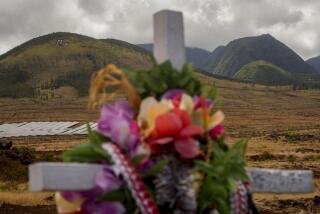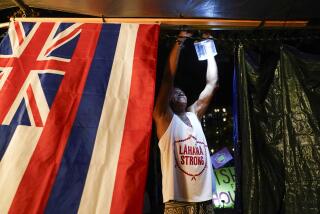Working Through the Tough Times in Paradise
- Share via
HONOLULU, Hawaii — He’s not faster than a speeding bullet. He can’t leap tall buildings. In fact, “Aloha Man,” as he calls himself, doesn’t do much at all, other than stand real still while dressed as a palm tree.
But, by situating himself in a small pond beside the sidewalk that runs along the beach in Waikiki, Shawn Ball, the 27-year-old man behind the palm fronds, is making enough money off tourists to survive.
Like thousands of others in Hawaii’s hospitality industry, Ball lost his job--as a limo driver/tour guide--after the Sept. 11 terrorist attacks.
And like some, out of necessity, he has turned to an entirely new career, albeit it as a palm tree.
Times are tough in paradise.
Already sagging before the attacks, tourism in Hawaii since September has dropped significantly among mainland visitors, and even more among the Japanese.
The subsequent job cuts--by airlines, hotels, restaurants and tour companies--are responsible for the bulk of the nearly 40,000 unemployment claims filed in the state since Sept. 11.
About one in five jobs in Hawaii is directly tied to tourism.
Kapiolani Community College in Honolulu recently launched Operation Imua, a project that helps displaced workers cope with their job loss and make career transitions. Imua is Hawaiian for “moving forward.”
The slowdown in tourism has hit hard in hotel-laden Waikiki, whose normally jammed beaches are now only dotted with tourists.
Most noticeably absent are the throngs of Japanese tourists who normally choose Waikiki over other island destinations.
“The major drop-off has been in the Japanese market segment,” said Dirk Soma, director of the Culinary Institute of the Pacific and co-chairman of Operation Imua. He said visitors from Japan are staying away more out of respect than fear.
Soma said that in the weeks after the attacks, thousands of workers were furloughed from hotels and restaurants, some of whom he has counseled as part of the program.
Reactions vary, he said, “from people breaking down and crying to those who are optimistic and are looking at it as an opportunity to change careers.”
Ball was more interested in money for dinner than expanding his horizons when he came up with the idea of Aloha Man.
Homeless since shortly after his job fell through, Ball had just gotten out of jail--for sleeping in a public place--when he stumbled upon a long hunk of palm tree bark that looked kind of like a shield.
He began accumulating other parts of palm trees--large fronds, with which he wove a hat, a vest and sleeves; more bark, which he strapped to his shins and thighs; coconut husks, which serve as sandals.
Clutching a large seed pod in his hand like a sword, he resembles something in between a tree and a warrior.
“I’m whatever you want me to be,” he said. “Use your imagination.”
He mostly stands motionless as tourists strolling the sidewalks of Kuhio State Beach pass by--a few hundred yards from the statue of surfing legend Duke Kahanamoku.
Once in a while he moves to startle them.
He used to splash them with water from the fake waterfall behind him--until police suggested he not do that.
Originally from southern Indiana, Ball joined the Navy, then worked for a Japanese company teaching English to the children of businessmen--first in Japan, then in Hawaii.
After four months in Hawaii, he lost that job and was hired by a tour company. He had almost completed his training as a limo driver when he was laid off, just after Sept. 11.
After running out of money for a room, he became Aloha Man last month--his first venture into street performing.
“Life is a little bit of an act no matter what you’re doing,” he said.
Aloha Man agrees that the crowds at the beach are way down, and the tattered cardboard box he sets out for donations isn’t filling up as much as he’d like. On his best day, he netted $55.
But for now--though he still wants to be a tour guide--it’s a living.
As Ball explained it to his parents in a phone call to Indiana, “I’m working on the street wearing wood, and people laugh and donate money to me.”
John Woestendiek is a writer for the Balitmore Sun, a Tribune company.
More to Read
Sign up for Essential California
The most important California stories and recommendations in your inbox every morning.
You may occasionally receive promotional content from the Los Angeles Times.













